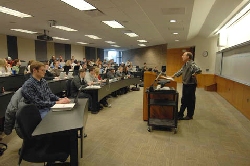Friends, this particular column is simed at the I.T. sector. However, corporate managers should also find it of interest. With that said...
2011 marks our 40th anniversary in the methodology business with the advent of our "PRIDE" product, the first commercial methodology for designing and developing information systems. "PRIDE" was born out of the need to implement the massive Management Information Systems (MIS) of the 1960's. As we began to market the product in 1971 people would inevitably ask, "What exactly is it?" Good question, as there had never been anything like it before. We thereby coined the expression "methodology" to refer to "PRIDE" as an organized process for building systems. The expression was considered somewhat avant-garde at the time and caught on. As the structured programming movement blossomed in the late 1970's the term also came to be associated with specific techniques for software design.
Recently there has been renewed interest in methodologies and quite a few papers written about them. Frankly, I've been disappointed in their observations and conclusions and, through this article, I hope to set the record straight.
The reason we chose the word "methodology" is because we recognized there were essentially two ways of designing and building any product, either one at a time or standard and reusable processes. The "one at a time" approach means you have to define your methodology with each new project. The "reusable" approach is a recognition the same processes can be applied to building products of similar type. For example, there is a standard and reusable methodology for designing and constructing houses, bridges, ships, or skyscrapers, or for the design and development of products, such as electronics, automobiles, jet engines, etc. An assembly line, as found in manufacturing, is perhaps the most visible implementation of the methodology concept. It consists of a series of workstations where certain tasks are performed, and a deliverable is produced for review before proceeding to the next workstation. There are methodologies for just about every type of work effort. It would be rather arrogant to assume systems development would be any different. All I.T. organizations have such methodologies, whether they are cognizant of it or not; some are well defined and applied consistently in an organization, others are not.
The concept of "methodology," as we implemented it in "PRIDE" in 1971, was to define the standard and reusable steps by which an information system was designed, developed, tested, installed, and reviewed. Again, we saw this as analogous to an assembly line in a factory where products are assembled in increments until a finished product rolls off the line, such as an automobile. This means a methodology operates independently from project management. If you do not care about time or costs, the "PRIDE" methodology could still be used to design and build a system. Many people believe project management is an inherent part of a methodology; it is not. A good methodology supports project management but it is certainly not dependent on it. Using the manufacturing analogy, an assembly line defines how a product is assembled. Only then can we apply production control to determine if the line is progressing on time and within costs. This means project management is analogous to production control in a manufacturing facility. It also means project management is dependent on a methodology, but not the reverse. Nonetheless, most people look to obtain a methodology for solving their project management problems, which it certainly can help, but that is only a byproduct and not its main focus.
Like an assembly line, we designed every phase, activity and task in the "PRIDE" methodology to produce a reviewable result, a "deliverable" of some kind which can be reviewed for completeness, thereby providing the means to build quality into the product during its development as opposed to inspecting it in afterwards. Deliverables can take many forms, be it a report, a file, a program, test data, etc. Regardless, "PRIDE" defines the 5W's + H, "Who is supposed to do What, When, Where, Why, and How," thereby everyone in the methodology is cognizant of what their duties and responsibilities are, including the work that precedes and succeeds them.
Methodologies can be defined for any form of work, be it I.T. related or otherwise. In "PRIDE", for example, we devised three complementary methodologies - one to study a business and devise an enterprise wide information strategy (Enterprise Engineering Methodology), one to build systems (Information Systems Engineering Methodology), and a third to develop the corporate data base (Data Base Engineering Methodology). These are not "make work" methodologies as much as they are designed to define the assembly lines of an I.T. organization.
When it comes to systems methodologies, there tends to be two schools of thought: linear or spiral development. Linear methodologies refer to the classical approaches for systems development as fostered by academia, whereby there are typically five basic phases of work:
1. FEASIBILITY STUDY
2. DESIGN
3. PROGRAMMING
4. TESTING
5. INSTALL AND REVIEW
Variations of the classic linear approach abound and can be found in many different places, including consulting firms, universities, and packaged offerings. It is sometimes called the "waterfall" methodology or SDLC (Systems Development Life Cycle).
The spiral approach is based on the premise the development process is evolutionary in nature (which, in fact, it is). The concept is to initially design a program, then add additional phases of work to constantly revise the program to enhance its features. From a Project Management perspective, the problem with this approach is that the project never ends. What is today referred to as "Agile" falls under this category.
Interestingly, neither the linear or spiral philosophies take parallelism into account, as is commonly found in product related methodologies. This is because most system developers do not grasp the concept of associating a system with a product. In reality, an information system is a collection of business processes (aka, "sub-systems") that can be depicted as a hierarchy of subassemblies and parts which is essentially no different than any other product structure. This philosophy thereby provides the means for the methodology to branch out to mirror the product structure. It also means sub-systems can be developed and delivered in parallel and concurrently, thereby allowing a system to implement its kernel components while the rest of the system is still under development.
I find it interesting that people in the industry still do not understand this simple concept of parallelism and insist on thinking linearly. Maybe it's because this is how most programmers work, one step at a time. This may be fine for a single program, but a system is much more robust in size and scope. Working and thinking in a linear manner has been the cause of many development disasters over the years. It is simply not practical or necessary to do so.
Over the years, one of the major criticisms of methodologies is the idea of forcing a small system change through the rigors of a robust methodology, thereby being viewed as a bureaucratic nightmare. Again, going back to the assembly line analogy, suppose we had to modify or correct a small change to a television set, would it make sense to take it through the whole television assembly line or rather go to just those workstation(s) necessary to implement the modification? The latter obviously. The same is true in systems development, in the event of a change, it is necessary to identify and execute only those phases (workstations) necessary to implement it. Big changes, many phases; small changes, few phases. Again, this is only possible with a product perspective.
What distinguishes "PRIDE" from other methodologies in this area is that it is based on a simple concept: "A system is a product that can be engineered and manufactured like any other product." If you buy into this concept, then it is possible to transform an I.T. department into an Information Factory. If you do not, you will probably continue to think linearly and complain about the bureaucracy of methodologies.
For more information on this subject, see:
Finally, let me leave you with a definition which we use in connection to "PRIDE":
Methodology - one or more phases of work to be executed in a prescribed manner. The methodology denotes a project's sequence of execution or network. All projects have a structure; some are based on key events to be completed and others are based on the structure of a product to be built. All projects have a beginning for planning, a middle for execution and an end for review. The beginning phase of most projects is performed through some form of feasibility study. The ending phase is usually an evaluation phase. Each phase, activity and operational step within a methodology must produce a reviewable deliverable to substantiate adherence to the methodology.
(See Deliverable).
Keep the Faith!
Note: All trademarks both marked and unmarked belong to their respective companies.
Tune into Tim's THE BRYCE IS RIGHT! podcast Mondays-Fridays, 11:30am (Eastern).
Copyright © 2010 by Tim Bryce. All rights reserved.
 What ever happened to the "Can Do" mentality of the United States? Let me give you an example; 1982 was a particularly profitable year for our company. We were flush with cash and like a lot of other companies in such a situation, wanted to spend it before the end of the year as opposed to letting the government tax us for it. At the time, we were in need of a new computer. PC's were not in vogue yet, and mainframes were cost prohibitive. Instead, we were interested in a midrange computer that could suit both our development and administrative needs. After considerable investigation, we settled on a DEC VAX (an 11/750 with VMS) from Digital Equipment Company in Massachusetts, a fine machine with a good reputation for reliability and service. Keep in mind, such computers back then were high ticket items costing thousands of dollars.
What ever happened to the "Can Do" mentality of the United States? Let me give you an example; 1982 was a particularly profitable year for our company. We were flush with cash and like a lot of other companies in such a situation, wanted to spend it before the end of the year as opposed to letting the government tax us for it. At the time, we were in need of a new computer. PC's were not in vogue yet, and mainframes were cost prohibitive. Instead, we were interested in a midrange computer that could suit both our development and administrative needs. After considerable investigation, we settled on a DEC VAX (an 11/750 with VMS) from Digital Equipment Company in Massachusetts, a fine machine with a good reputation for reliability and service. Keep in mind, such computers back then were high ticket items costing thousands of dollars. Tim Bryce is a writer and the Managing Director of M. Bryce & Associates (MBA) of Palm Harbor, Florida and has over 30 years of experience in the management consulting field. He can be reached at timb001@phmainstreet.com
Tim Bryce is a writer and the Managing Director of M. Bryce & Associates (MBA) of Palm Harbor, Florida and has over 30 years of experience in the management consulting field. He can be reached at timb001@phmainstreet.com "Enterprise Engineering" is a term we coined in 1988 to reflect the third and final part of our concept of Information Resource Management (IRM) representing a triad of methodologies to design, develop, and control all of the resources needed to support the information requirements of an enterprise, be it a commercial or nonprofit endeavor. Earlier we had produced organized methodologies for "Information Systems Engineering" and "Data Base Engineering," but now our attention turned to producing an Enterprise Information Strategy, a plan for satisfying an enterprise's information requirements based on business priorities.
"Enterprise Engineering" is a term we coined in 1988 to reflect the third and final part of our concept of Information Resource Management (IRM) representing a triad of methodologies to design, develop, and control all of the resources needed to support the information requirements of an enterprise, be it a commercial or nonprofit endeavor. Earlier we had produced organized methodologies for "Information Systems Engineering" and "Data Base Engineering," but now our attention turned to producing an Enterprise Information Strategy, a plan for satisfying an enterprise's information requirements based on business priorities.  A couple of weeks ago I attended a Chili cookoff at a nearby town. For the uninformed, a "cookoff" is a cooking competition that concentrates on a particular dish, in this case, chili or "chili con carne" to be more precise, a spicy meat stew which is particularly popular in the South. There were a few dozen vendors in attendance and I took my time to sample all of them. I've tasted a lot of different interpretations of chili over the years, e.g., shredded beef versus ground beef, various types of chili peppers, textures, not to mention how served, such as on a bed of rice, on spaghetti, with corn bread, etc. Because of these many variations, I like to believe I have a pretty open mind when it comes to chili.
A couple of weeks ago I attended a Chili cookoff at a nearby town. For the uninformed, a "cookoff" is a cooking competition that concentrates on a particular dish, in this case, chili or "chili con carne" to be more precise, a spicy meat stew which is particularly popular in the South. There were a few dozen vendors in attendance and I took my time to sample all of them. I've tasted a lot of different interpretations of chili over the years, e.g., shredded beef versus ground beef, various types of chili peppers, textures, not to mention how served, such as on a bed of rice, on spaghetti, with corn bread, etc. Because of these many variations, I like to believe I have a pretty open mind when it comes to chili. Good question. For years, controlling the work environment was considered management's responsibility. After all, they were the ones charged with the task of implementing certain business functions. But the times have changed or have they really? Today, most young people expect the corporate culture to adapt to their life style and work habits, not the other way around. And there is some evidence to this effect. For example, suit and ties have been replaced by some rather avant-garde dress. Even "Casual Fridays" have been replaced by grungy appearances on a daily basis. This has manifested itself to the overall office appearance and organization. Further, most younger office workers are now plugged into iPods to avoid social interaction. One has to wonder if this new corporate culture has truly been conducive to completing assignments on time and within budget. If not, maybe a change is in order.
Good question. For years, controlling the work environment was considered management's responsibility. After all, they were the ones charged with the task of implementing certain business functions. But the times have changed or have they really? Today, most young people expect the corporate culture to adapt to their life style and work habits, not the other way around. And there is some evidence to this effect. For example, suit and ties have been replaced by some rather avant-garde dress. Even "Casual Fridays" have been replaced by grungy appearances on a daily basis. This has manifested itself to the overall office appearance and organization. Further, most younger office workers are now plugged into iPods to avoid social interaction. One has to wonder if this new corporate culture has truly been conducive to completing assignments on time and within budget. If not, maybe a change is in order. To me, the most significant outcome of the past mid-term elections was how it split the country along ideological lines. There has always been substantial differences between the Democrats and the Republicans, but nothing as pronounced as what we are witnessing today. I remember the sharp differences of LBJ versus Goldwater in 1964, Nixon and Humphrey in 1968, and Reagan/Carter in 1980, but I do not remember a time in our our history where the people have been so bitterly divided in terms of how the country should be run. The differences between the two are often described as the "Haves versus the Have Nots" or "Givers versus Takers," but more precisely, the two sides can be distinguished by the following attributes:
To me, the most significant outcome of the past mid-term elections was how it split the country along ideological lines. There has always been substantial differences between the Democrats and the Republicans, but nothing as pronounced as what we are witnessing today. I remember the sharp differences of LBJ versus Goldwater in 1964, Nixon and Humphrey in 1968, and Reagan/Carter in 1980, but I do not remember a time in our our history where the people have been so bitterly divided in terms of how the country should be run. The differences between the two are often described as the "Haves versus the Have Nots" or "Givers versus Takers," but more precisely, the two sides can be distinguished by the following attributes: My entire adult life has been spent trying to do what is right for all the people I've come in contact with, be it my customers who depend on me for advice, employees who wanted a comfortable and meaningful workplace, and constituents in the many nonprofit groups I have volunteered in over the years. You may not agree with my tactics now and then (I am most definitely not a politician) but I have always tried to be honest with the people I have come in contact with. You may not like what I have to say, but you know precisely where I stand on an issue. Throughout all of this, I have learned that telling the truth has cost me more than one friend over the years, but it is important to me personally to be able to look at myself in the mirror without blushing. As someone who has had to say "the Emperor has no clothes" on more than one occasion, I realize it requires some rather thick skin. Maybe this is why honesty is no longer in vogue anymore as it is easier and less painful to be so. It is a sad sign of our society when political correctness is more coveted than truth.
My entire adult life has been spent trying to do what is right for all the people I've come in contact with, be it my customers who depend on me for advice, employees who wanted a comfortable and meaningful workplace, and constituents in the many nonprofit groups I have volunteered in over the years. You may not agree with my tactics now and then (I am most definitely not a politician) but I have always tried to be honest with the people I have come in contact with. You may not like what I have to say, but you know precisely where I stand on an issue. Throughout all of this, I have learned that telling the truth has cost me more than one friend over the years, but it is important to me personally to be able to look at myself in the mirror without blushing. As someone who has had to say "the Emperor has no clothes" on more than one occasion, I realize it requires some rather thick skin. Maybe this is why honesty is no longer in vogue anymore as it is easier and less painful to be so. It is a sad sign of our society when political correctness is more coveted than truth. During the course of the past election it occurred to me that most of the candidates possess little formal education in how to govern or be an effective politician. Instead, they learn their craft on the job and through the guidance of a team of handlers, including media specialists. Even though I find the concept of career politicians distasteful, there are a lot of people who appear to be bent on becoming one. With this in mind, I have always been a proponent of establishing a true college environment for becoming a politician regardless if it at the municipal, state, or federal level. Most politicians take too much time to learn their job and make a series of mistakes along the way. Formal education and training could greatly alleviate this problem. Other professions require certification, why not politicians?
During the course of the past election it occurred to me that most of the candidates possess little formal education in how to govern or be an effective politician. Instead, they learn their craft on the job and through the guidance of a team of handlers, including media specialists. Even though I find the concept of career politicians distasteful, there are a lot of people who appear to be bent on becoming one. With this in mind, I have always been a proponent of establishing a true college environment for becoming a politician regardless if it at the municipal, state, or federal level. Most politicians take too much time to learn their job and make a series of mistakes along the way. Formal education and training could greatly alleviate this problem. Other professions require certification, why not politicians? Perhaps the most common joke at a high school reunion is when someone inevitably makes the observation, "Gee, when did we become our parents?" To me, the answer is simple: at age 40. Actually, a lot depends on when we were born as well as our offspring, but it is fair to say the transformation begins in our early 40's. In our twenties, most of us are still learning to spread our wings and begin our careers. Love or lust typically raises its ugly head during this period, and along comes children. At this stage, I don't think we're our parents quite yet as we are still learning to find our way through the world and how to cope with the ankle-biters around us.
Perhaps the most common joke at a high school reunion is when someone inevitably makes the observation, "Gee, when did we become our parents?" To me, the answer is simple: at age 40. Actually, a lot depends on when we were born as well as our offspring, but it is fair to say the transformation begins in our early 40's. In our twenties, most of us are still learning to spread our wings and begin our careers. Love or lust typically raises its ugly head during this period, and along comes children. At this stage, I don't think we're our parents quite yet as we are still learning to find our way through the world and how to cope with the ankle-biters around us.
 Now that we have survived the elections, where we were incessantly told what is wrong with America, perhaps it is time to reflect on what is right with it. I realize there are still hard feelings on both sides of the political spectrum, but we should shake it off and begin by thanking God we had a peaceful transition and not a bloody military coup like some countries experience. It proves the system works. We have had more than enough scurrilous rhetoric which shows how embarrassingly barbaric we can become, let's try something more positive instead.
Now that we have survived the elections, where we were incessantly told what is wrong with America, perhaps it is time to reflect on what is right with it. I realize there are still hard feelings on both sides of the political spectrum, but we should shake it off and begin by thanking God we had a peaceful transition and not a bloody military coup like some countries experience. It proves the system works. We have had more than enough scurrilous rhetoric which shows how embarrassingly barbaric we can become, let's try something more positive instead. Have you ever been looking through a mega-hardware store/garden shop and not been able to find precisely what you are looking for? Instead, you settle for something else which you take home, try it, and regret having purchased. Instead of returning it though, you think it is not worth your time and throw it in the garbage. Not only is the exact merchandise not available, merchants even go so far as to make the item difficult to return in order to discourage you from doing so. Even if you do, there may even be a penalty fee associated with it. You're stuck and you learn to live with it.
Have you ever been looking through a mega-hardware store/garden shop and not been able to find precisely what you are looking for? Instead, you settle for something else which you take home, try it, and regret having purchased. Instead of returning it though, you think it is not worth your time and throw it in the garbage. Not only is the exact merchandise not available, merchants even go so far as to make the item difficult to return in order to discourage you from doing so. Even if you do, there may even be a penalty fee associated with it. You're stuck and you learn to live with it. 
 You have no doubt heard my criticisms of computer programmers in the past, a lot of which dealt with discipline, organization and accountability issues. Quite often problems begin with the recruiting process whereby companies do not take time to substantiate the programmer's knowledge. This is what caused me to write
You have no doubt heard my criticisms of computer programmers in the past, a lot of which dealt with discipline, organization and accountability issues. Quite often problems begin with the recruiting process whereby companies do not take time to substantiate the programmer's knowledge. This is what caused me to write  It's election day here in the United States and the end of a grueling and quarrelsome race pitting one ideologue against another. It was bitter even within the parties as evidenced by the highly contested primary races. Undoubtedly there will be a lot of hard feelings regardless of the outcome. Not too long ago it was customary for the loser in a political contest to concede defeat and wish the victor good luck in his/her endeavors, but it seems such concession speeches are becoming few and far between. When they are finally given, they are done so grudgingly and not necessarily with the most sincerity. Frankly, I wouldn't be surprised if today they weren't sent by text messaging which is not exactly the best way to convey a heartfelt congratulations, e.g.,
It's election day here in the United States and the end of a grueling and quarrelsome race pitting one ideologue against another. It was bitter even within the parties as evidenced by the highly contested primary races. Undoubtedly there will be a lot of hard feelings regardless of the outcome. Not too long ago it was customary for the loser in a political contest to concede defeat and wish the victor good luck in his/her endeavors, but it seems such concession speeches are becoming few and far between. When they are finally given, they are done so grudgingly and not necessarily with the most sincerity. Frankly, I wouldn't be surprised if today they weren't sent by text messaging which is not exactly the best way to convey a heartfelt congratulations, e.g., Well, here we are on the eve of an election day for what is perhaps the most important, if not most controversial, mid-term election in recent memory. Over the last few months you have heard me discuss the virtues of voting, that it is an inherent part of our civic duty. You have also heard me describe the problems with such things as the economy, Obamacare, term limits, and electing incumbent career politicians. Many of you have agreed with me, but I suspect it wasn't unanimous. Nonetheless, I was attempting to encourage people to engage their brains and take a position, one way or another. If you have thought about these issues carefully, then I want you to most definitely vote, one way or another. If you are satisfied with the status quo in government, fine, vote your conscious. If you are not satisfied with the status quo, as I am, fine, vote your conscious. I cannot fault anyone for voting under either scenario. You are acting as responsible citizens.
Well, here we are on the eve of an election day for what is perhaps the most important, if not most controversial, mid-term election in recent memory. Over the last few months you have heard me discuss the virtues of voting, that it is an inherent part of our civic duty. You have also heard me describe the problems with such things as the economy, Obamacare, term limits, and electing incumbent career politicians. Many of you have agreed with me, but I suspect it wasn't unanimous. Nonetheless, I was attempting to encourage people to engage their brains and take a position, one way or another. If you have thought about these issues carefully, then I want you to most definitely vote, one way or another. If you are satisfied with the status quo in government, fine, vote your conscious. If you are not satisfied with the status quo, as I am, fine, vote your conscious. I cannot fault anyone for voting under either scenario. You are acting as responsible citizens.